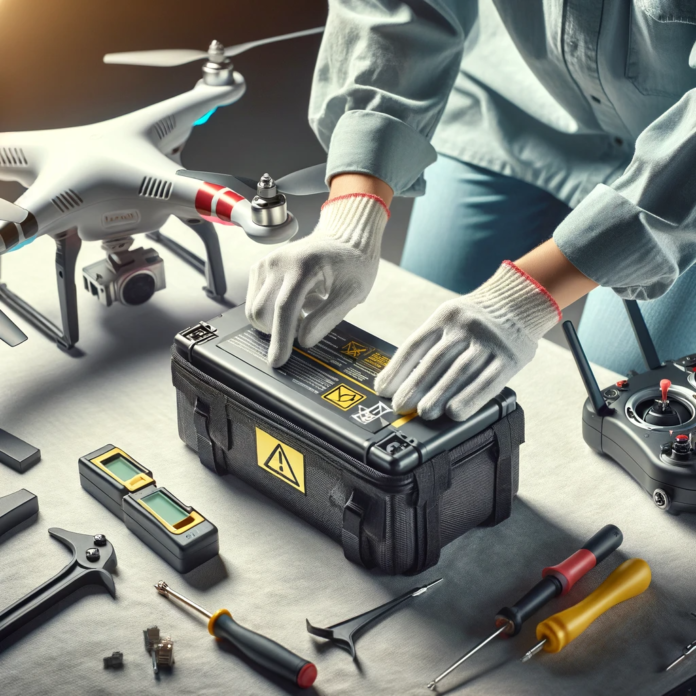
In the exciting world of drone technology, it is vital to understand the safety concerns associated with battery handling. With the increasing popularity and widespread use of drones, it is crucial for drone enthusiasts to prioritize safety precautions when it comes to batteries. From proper storage and charging techniques to avoiding overcharging or mishandling, ensuring the safe handling of drone batteries is essential to prevent accidents and maintain the longevity of these powerful devices. Let’s explore the key safety concerns for battery handling in drones and how you can address them effectively.
Safety Concerns for Battery Handling in Drones
Introduction to Drone Battery Safety
When it comes to operating drones, battery safety should be a top priority. Drones rely on batteries to power their flight, and mishandling these batteries can have serious consequences. Understanding the safety concerns associated with battery handling in drones is crucial for safe and responsible drone operation.
Importance of Battery Safety in Drones
The importance of battery safety in drones cannot be overstated. Drones are increasingly being used in a variety of industries, including aerial photography, videography, search and rescue operations, and delivery services. With their rising popularity, the number of drone accidents has also increased. Many of these accidents can be attributed to inadequate battery safety practices. By prioritizing battery safety, drone operators can minimize the risk of accidents, protect their equipment, and ensure the safety of people and property in their vicinity.
Factors Affecting Battery Safety in Drones
Several factors can affect battery safety in drones. One key factor is the quality of the batteries themselves. Cheap and poorly manufactured batteries pose a greater risk of malfunction or failure, increasing the chances of accidents. Additionally, extreme temperatures can affect battery performance and stability. Exposure to high or low temperatures can cause batteries to overheat or freeze, leading to a decrease in overall battery life and potential safety hazards.
Physical Safety Concerns
When handling drone batteries, there are certain physical safety concerns to keep in mind. Dropping or mishandling a battery can result in damage or even deformation. Ruptured batteries can leak toxic chemicals and pose a threat to both humans and the environment. It is essential to handle batteries with care and ensure they are stored securely to prevent any physical damage.
Chemical Safety Concerns
Drone batteries contain chemicals that are potentially hazardous if mishandled. Lithium-ion batteries, commonly used in drones, have flammable electrolytes that can lead to fire or explosion if the battery is damaged or punctured. Prolonged exposure to extreme temperatures can also cause the battery to release toxic gases. It is vital to handle drone batteries with caution and avoid subjecting them to unnecessary risks.
Fire and Explosion Risks
Fire and explosion risks are significant concerns when it comes to drone battery safety. Mishandling or abuse of batteries can result in thermal runaway, a process in which the battery heats up rapidly, potentially leading to a fire or explosion. It is crucial to avoid overcharging or exposing batteries to excessive heat to minimize the risk of thermal runaway. Additionally, storing batteries in a fire-resistant container and keeping a fire extinguisher nearby is a wise precautionary measure.
Proper Battery Handling and Storage
To ensure battery safety, proper handling and storage practices are of utmost importance. It is essential to always handle batteries with clean, dry hands and avoid touching the contacts. Storing batteries in a cool, dry place away from direct sunlight and extreme temperatures is crucial. Furthermore, batteries should never be stored near flammable materials. Storing batteries in a fireproof bag or container is also recommended to minimize the risk of fire or explosion.
Battery Charging Safety
Proper battery charging is vital for battery safety in drones. Following the manufacturer’s instructions and using the specified charger is crucial to avoid overcharging or overheating the battery. It is advisable to never leave a charging battery unattended and ensure the charging area is well-ventilated. Regularly inspecting the charging cable and connectors for any signs of damage is essential to prevent accidents caused by faulty equipment.
Transportation Safety
Transporting drone batteries safely is another critical aspect of battery handling. When traveling with drone batteries, it is important to keep them in your carry-on luggage rather than checked baggage. This is because the temperature and pressure variations in the cargo hold of an aircraft can affect battery performance and potentially lead to safety hazards. It is also crucial to protect the battery terminals from damage during transit, as damaged terminals can lead to a short circuit.
Monitoring and Maintenance
Regular monitoring and maintenance of drone batteries are essential for ensuring their safe operation. Checking the battery’s voltage, capacity, and overall condition before each flight is crucial. If any signs of damage or deterioration are detected, it is important to replace the battery immediately. Additionally, keeping track of the battery’s usage and adhering to the manufacturer’s recommended lifespan will prevent the use of old or unreliable batteries, reducing the risk of accidents.
In conclusion, battery safety is a critical aspect of responsible drone operation. Whether you are a hobbyist or a professional drone operator, understanding and implementing proper battery handling practices is crucial for minimizing the risk of accidents, protecting equipment, and ensuring the safety of people and property. By following the guidelines outlined in this article, you can ensure the safe and efficient operation of your drone, allowing you to enjoy the exciting world of drone technology while keeping safety a top priority.

